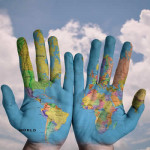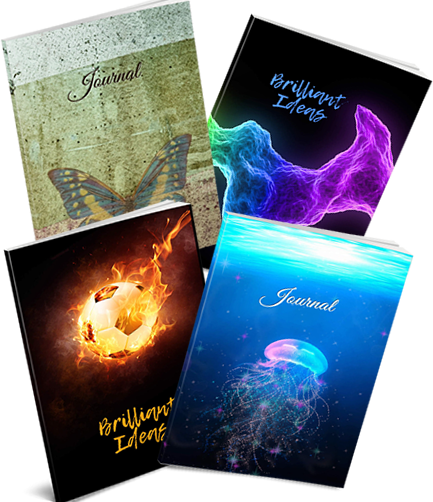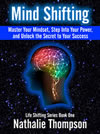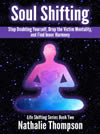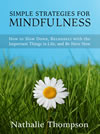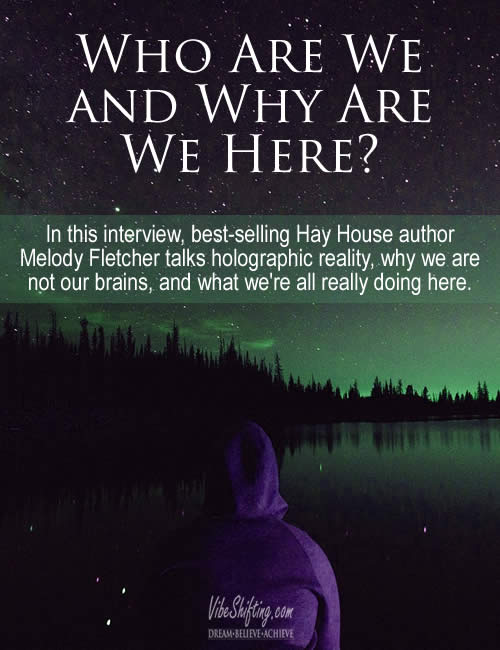 We’re going down the rabbit hole today in this interview with guest expert Melody Fletcher. We’re talking about the great existential questions of humanity: who are we and why are we here; why we’re not our brains; the nature of reality; and Melody’s experiences with a client’s dying father.
We’re going down the rabbit hole today in this interview with guest expert Melody Fletcher. We’re talking about the great existential questions of humanity: who are we and why are we here; why we’re not our brains; the nature of reality; and Melody’s experiences with a client’s dying father.
This Expert Series Guest Interview Has Two Parts:
1815 Who Are We And Why Are We Here?
1816 Why We Are More Than We Are
[powerpress]
In part two of our interview, which airs next week, Melody talks about what happens after we die, how we all have more than five senses, how to strengthen our intuitive abilities, and what it is that she actually does when she connects with the dearly departed.
Transcript: Who Are We And Why Are We Here?
Nathalie: Hello everyone and welcome back. Today I have another special guest for you. We are talking with best-selling Hay House author, Melody Fletcher. Melody is an expert in the Law of Attraction who doesn’t believe that personal development has to be so gosh-darned serious all the time.
She helps people who are tired of not being happy to understand how the technology of reality actually works, and remember how powerful they truly are so they can finally get the lives they’ve always dreamed of. Welcome, Melody, I’m so glad you can be here with us today!
Melody: Thank you. I’m so happy to be here as well.
How Melody and Nathalie “Met”
Nathalie: We were just talking just before we started recording we were saying we’ve known each other in the online way for years now, but we were thinking, “I don’t think we’ve ever actually spoken in person before”.
Melody: No, no we haven’t. I know, I started my blog in, I think it was at the very beginning of 2011, I started my web site at the end of 2010, and I don’t remember when you came in but at some point I think you started commenting on my blog or something and we got into contact.
And I know you’ve been around for a long time. And we’ve written a few e-mails over the years that back and forth. I remember when you started your blog and went over it checked it out, and it’s been amazing to watch you grow. And I don’t think we’ve ever actually spoken in all that time. So it’s about time.
Best-selling author and #LawOfAttraction expert Melody Fletcher takes the hot seat in this #podcast episode... Share on XPutting Melody on the Hot Seat
Nathalie: Yes, definitely. So, we’re going to dive right into this today because you’ve been doing this, like you just said, for quite a while now. So you know this stuff. You’re you’re kind of one of the inter-webs biggest experts on Law of Attraction stuff these days, right?
Melody: Oh, thank you!
Nathalie: So I’m going to put you in the hot seat today, if that’s ok?
Melody: Oh yeah, do it. I love it.
Nathalie: We’re going to get into the really juicy stuff because I know you can handle this. So I’m going to start with a question for you, Melody. Actually, I’m going to hit you with a bunch of questions here.
Melody: OK.
Nathalie: OK? Who are we? What is this place? Why are we here? And what is the frickin’ point of it all?
Melody: So, no pressure then.
Nathalie: No pressure whatsoever.
The Big Existential Question
Melody: Well, you know, believe it or not I get that question a lot because it’s the existential question, isn’t it, that all of humanity has been asking itself since the beginning of when we were zygotes or something. Who are we.
Melody: And we’ve come up with various conclusions. And what I offer is essentially just another one because I can’t claim that this is “the” truth or anything like that, but it’s what really resonates with me and it’s what really resonates with my readers.
Melody: And so what I always say is go find something that resonates with you. Because nobody can ever prove to you what is real and what isn’t. And so, what I have discovered, and this resonates with me and it makes sense and it makes sense of the world. What I’ve discovered is that we are we’re definitely more than these human selves.
The Video Game Analogy
Melody: The way that I see it is I like to use the analogy of the video game. That this is really like a virtual reality video game and our human cells are like our little video game characters or avatars. And the game analogy helps us to make sense of a lot of things, but first and foremost, that we don’t take it too seriously, you know?
Melody: It really isn’t all life or death because when your video game character dies, it’s not the death of you. You can just respawn and the player is absolutely fine. And so when you go into a video game, nobody wants their video game character to just sit there and do nothing and just walk in place.
Nobody builds a little bubble cocoon around them and says “nothing shall happen to you, you shall have no adventures so that you’re safe”, because we’re not that afraid in a video game.
The Dragon in the Game
Melody: So we want to have adventures, and we want to go on quests, and we even want to have monsters to fight with. We don’t want it to be boring, above all.
Melody: And so that kind of can help us to understand that life’s challenges aren’t necessarily… they’re not punishments and they’re not things that are being done to us. These are things that we have chosen because we’re here to play. We’re here to experience.
Nathalie: They’re the dragon in the game…
Melody: Yeah! We want the dragon, we want the monster, because we know we can beat them. We know we can beat them. And so, from that perspective, from the player perspective, there isn’t that fear.
Who we are and why we’re here, why we’re not our brains; and the nature of reality. All this and more in this interview with @deliberateblog’s Melody Fletcher! Share on XWe’re Here to Experience
Melody: And we’re here to experience. Point blank, we’re here to experience. We’re not here to learn in order to progress, although we do progress, but it isn’t a requirement. It’s just how we’re built.
Melody: We are not here… This is not a school. This is not some place where we have to prove ourselves in order to move on. It really is more like we’ve plunged ourselves into this fog where we forget who we are, which allows us to re-experience who we are in a completely different way.
We’re All Masters
Melody: Because what greater challenge for a master than to forget their mastery? There’s no greater challenge. And we are masters. Every single one of us. Even the dumb ass down the street who you don’t think could possibly be a master, is a master. Maybe has forgotten it, but is a master.
Melody: And so we’re all masters at this and we’ve come to play. And what we have done is we’ve plunged ourselves into the densest, darkest, energy we possibly could. And this would be where humanity quote unquote “began”, and have started from that dense energy to work our way through it, to basically remember who we are. And now, at this this point in time…
The Point of the Game?
Nathalie: So can I ask you a question there?
Melody: Yeah.
Nathalie: If this is a game and we we’re doing this, we are here because we wanted an adventure basically, is that the big point of it, is that we’re trying to get to the point where we remember that? Is that kind of the point of the game, to get to the point where you remember? When you fully know that that’s… Is that how you win the game, basically, that you remember?
Melody: It’s the first milestone.
Nathalie: Oh, it’s just the first milestone?
Melody: Yeah. Because what we’re in the process of doing right now is remembering who we are. And that doesn’t end the game, it changes the game.
Levelling Up
Nathalie: OK. So like leveling up?
Melody: Yeah. I mean, there are many more levels to this than just you know “oh I’m human, oh I’m more than human”. “Oh I’m powerless. Oh I’m I’m actually incredibly powerful”. There are a lot more levels to discover. That’s what’s so exciting about this game. There’s so many more levels to discover. Yeah?
Melody: We’re barely scratching the… I mean, the deepest meditation you’ve ever had, if you’ve ever gone way down the rabbit hole where you’re like “oh my god I’m in psychedelic land!”, that’s barely scratching the surface of what’s available, of what we can perceive and what we can affect and what we can achieve.
Melody: So this is where we say it’s not Super Mario Kart. It’s not that simple of a game. There are many, many, many, many, many more levels to this. And so we’re basically playing level 1 right now.
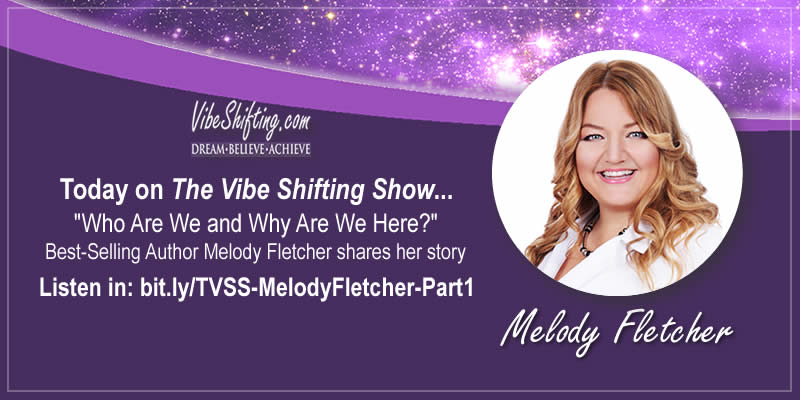
Plato’s Cave
Nathalie: This harkens back to… I’m having memories of first year philosophy and that Plato’s cave allegory, where if you had an individual, if you had a guy who’s spent his entire life, he was born in a cave.
And he’d spent his whole life in a cave. And he was chained in such a way that he could only face one wall and couldn’t look behind him or anything. But there was a fire behind him and he could see shadows on the wall. That would be his entire experience of existence and he would consider that reality.
But then what would happen if he ever broke free of those chains and turned around and saw that those shadows aren’t actual reality, they’re being caused by something that’s happening behind him.
And then it sort of kept going: what if he gets out of this cave and suddenly finds himself climbing up through a tunnel into this land of brilliant light? He wouldn’t be he wouldn’t be able to understand it. He wouldn’t be able to process it. At first it would just be so blinding he wouldn’t even be able to see it, really.
Melody: Yeah.
Nathalie: So.
Mind-Blowing Layers of Reality
Melody: And, you know, if you consider that this individual sort of acclimates to “OK, there’s trees” and understands there’s trees and there’s sunlight and finally acclimates to that. But then… So that’s a huge event, right?
Nathalie: Yeah.
Melody: Oh my god my world has just changed. Everything is different than I thought it was. I am not who I thought I was. But imagine that individual ventures further into that world. And then maybe discover something like a mirror. That would completely blow his mind again. Then maybe comes across a car. Maybe it comes across a city.
Melody: Each one of those, you consider those like layers
Nathalie: Bigger and bigger layers.
Melody: It would be again, blowing his mind. Again, completely shattering who he thought he was and what the world.
The Holographic Universe Theory
Nathalie: About a year ago there was . .. it’s not a new theory, but the holographic universe theory, that’s been around for decades.
But about a year ago there was an international group of scientists that came up…. They did some study in microwave background radiation, cosmic microwave background radiation, and they looked at data. They found a whole lot of data sort of hidden in that, just with what new technology was giving them the ability to do.
And their big discovery was that this theory of the holographic universe, they couldn’t rule it out anymore. It was as powerful an explanation of the beginning of the universe as the cosmic inflation theory.
Einstein and Quantum Physics
And they’re thinking, they were saying that this could be a way… Because right now, they’re trying to reconcile Einstein’s theories with quantum physics. It kind of falls apart. Einstein’s stuff works well at describing the big things but when you come down to the teeny-tiny things, it just doesn’t work anymore.
So they’ve been trying to find a way to reconcile the big stuff and the little stuff. And they’re saying that this holographic universe theory may be a step on the way to being able to do that.
But, the theory says that everything that we experience, everything around us our whole lives, everything we see and feel and touch, could be that we — sorry, that we experience as three dimensional — may be a holographic projection on a two dimensional surface. So, like those things on a credit card, the little holographic stickers on a credit card.
So that I thought was kind of interesting. That adds a whole other layer onto things.
If the Universe is one big holodeck, then who’s creating the hologram? Deep thoughts in this #LawOfAttraction podcast episode. #lightworkers Share on XReality as a Star Trek Holodeck
Melody: Well, here’s the thing. I don’t see it as a holographic graphic projection on the two dimensional… That’s the only thing that pings wrong for me on this is it’s not a two dimensional surface. That would be our understanding of it. But that is, to me, that is not how it works. But it is a hologram.
Nathalie: OK.
Melody: That’s not a theory anymore, not with the experiences I’ve had. It is not a hologram. It is about as close of an explanation as we can get to at the moment, seeing it as a hologram.
Nathalie: So you can get more like a Star Trek holodeck kind of experience?
Melody: Yes.
Nathalie: So we’re immersed in it and it is three dimensional from our experience, but it is a projection from elsewhere?
Melody: No. It’s a projection from us.
Nathalie: From within us?
Melody: From within us. We’re the projector. That’s that’s where our power lies. In an actual hologram you’ve got a light source, you’ve got a laser, yeah? And it hits several other elements, mirrors and yada, yada. But you’ve got that laser, we are the originator of that laser.
Who Creates the Hologram?
Nathalie: So who’s holograph am I living in? Am I creating it or are you creating it?
Melody: Yours. So, my experience of you is my holograph. Your experience of me, which I have actually in this moment, if I’m truthfully, really honest, I have absolutely no idea what you’re experiencing.
All I can ever see from my perspective is what I am experiencing in this moment, what I might think you’re experiencing, what I can project upon you. But I can’t even prove that you’re real, really. Yeah? Not if I’m honest.
Nathalie: True. This is true.
Melody: I can believe that you’re real. I can choose to accept that you’re real. But can I really, really prove it? Because if I understand that all…
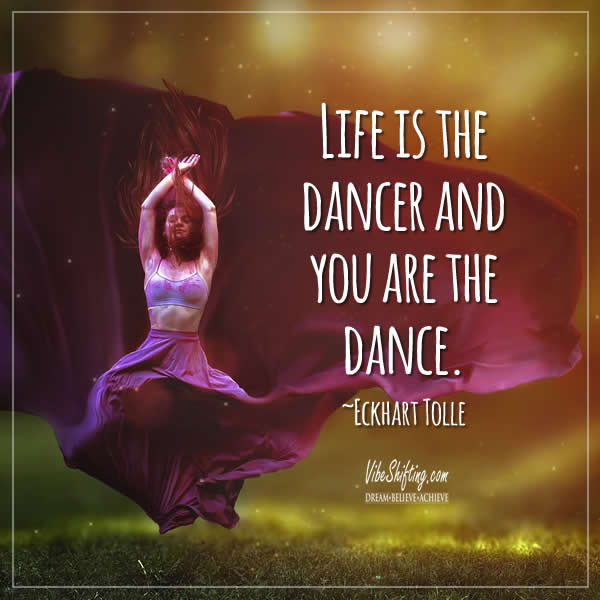
Energy Translation
Melody: Let’s talk about our five senses, and we have far more than five senses, but even in our five senses that we all sort of agree on: touch, taste, smell, sound and sensation. It’s all just energy being translated by our brains.
We know this. Neurologists know this, yeah? It’s just energy translated by our brains into whatever we… the actual vision, seeing a picture… your eyes don’t create a picture, your brain does. Your ears don’t create sound, your brain does. And then you actually have people who have a couple of wires crossed who hear pictures and smell sound.
Nathalie: Synaesthesia.
Melody: Exactly. Yeah? And so it’s our brains actually creating the pictures and the sensations and the tastes and the smells and everything. And it’s the same with everything. It’s our brain creating the hologram. Our brain translates energy into something that we can comprehend.
Are We Our Brains?
Nathalie: Let me ask you another question then, because my son asked me this, he came home after school on Friday and he surprised me. He said “Are we our brains?” And I said “No…” And he said “Well, some of the guys at school had a lot of evidence that says we’re our brains because what happens when our brains get hurt? We’re not the same anymore.”
So I had to think about that because we know, experience tells us, science tells us that when there are traumatic brain injuries it can completely change the person.
And fortunately he got distracted by something at the time but I had to think about an answer to that. Because we instinctively know that we are more of this sort of meat suit that we’re wearing. But to try and explain it to other people, especially to a child…
The Universal Translator Analogy
Melody: Well, let me give you an analogy that that your son should very easily understand. So a little bit of a sci-fi analogy. Consider that you have a universal translator. He should know what a universal translator is, right?
Nathalie: I don’t let them watch Star Trek. My children are still quite young.
Melody: Ok. So imagine a device that you can speak through. And when you speak through this device, no matter what language somebody else understands, they will understand what you’re saying.
Nathalie: Yeah.
Melody: So you could talk to somebody who speaks only Chinese, you speak into this device and they will hear Chinese.
Nathalie: Yeah.
Melody: Yeah? And if they speak into this device, you will hear it as English. No matter what language they’re putting in there. Right?
Nathalie: Yeah.
Melody: You can understand. Now if somebody… let’s say you drop your universal translator. You drop your device and it’s cracked. And it starts to malfunction. Have you been hurt, or has the device been hurt?
When you speak into the device it might now garble what you say. It might garble what they say so that you don’t fully understand what they’re saying. Or it might even say some things wrong. But does that mean that you are hurt or you’re actually saying something different, or that you’re now perceiving it differently because it’s being translated differently?
Our Brains Are Machines
Melody: So we are not our brains. Our brains are like machines that are like computers. They are translators of energy and they’re very, very good at it. They’re are also automation machines. Yeah? They help us in various different ways. They have various different functions. And they’re very good at those functions.
But they are machines. They are not us. They are machines that we use. They are tools that we use. And when they get damaged, they can absolutely change. I mean, if this is the device that helps you perceive your hologram and it gets damaged, you’re going to perceive your hologram in a weird, distorted way. Makes sense?
Nathalie: Yeah.
Melody: Yeah? And what you what you put out is going to come out in a weird, distorted way. That doesn’t mean that the player, so to speak, the user of the device, has been damaged. That is never the case.
How do we know we’re more than our brains? This and more deep thoughts in my interview with best-selling #HayHouse author Melody Fletcher! #LawOfAttraction Share on XOur Brains Are Interpreters
Nathalie: I love that. So the brain is more… It’s the technology that interprets the energy that is you.
Melody: Yes.
Nathalie: And when the technology is damaged, as when any technology is damaged, it doesn’t work the way it’s meant to.
Melody: Yeah.
Nathalie: See now, why couldn’t I just think of that at the time?
Melody: Well, because then we wouldn’t have been able to have this wonderful conversation.
Nathalie: That’s true, too. Reasons for everything, right?
Melody’s Experience with A Client’s Dying Father
Melody: Yeah. You have to really think of it… You know, I’ve had the chance to vibrationally observe… I was talking to a client who was going through the death of her father. And it was actually a client’s friend. I’d never spoken to this woman before, but she said “Will you speak to my friend?” and the friend was willing.
And I got on the phone with her. And her father lay dying and she was very distraught. And one of the things that happened is her father had been catatonic for a long time. He had Alzheimer’s, he was withdrawing, withdrawing. And then the whole body didn’t work anymore, and he was basically in a kind of an almost comatose space, had not been lucid for a long time, had not even been awake for a long time.
And the doctors gave him something. I don’t remember why they did this, but they gave him something to try to bring him around one more time. Maybe so the family could say goodbye or just to see if they could, I don’t know why you would do this, but they did this.
And it caused her great distress. Because he… she said his movements were very jerky and he seemed like he was really suffering.
Checking in With His Higher Self
And I checked in with him, because at that moment he was still alive. And I checked in with him and he had not experienced any pain. In fact, what it was was he only had about 5 percent focus left in the body. And when they asked him to come back, he did. But it was like trying to reanimate a broken puppet. You know?
The body just wasn’t working anymore, and wasn’t meant to work. And he wasn’t going to expend the energy to focus back into the body to heal the body because he was on his way out. He knew he was on his way out. He was already partying in the nonphysical, 95 percent of him.
So he brought back just enough attention into the body to allow him to say and hear what he needed to say and hear so that he could have this interaction, but not enough to fully animate it.
Our Bodies Need Focus to Operate
And that was the experience of it and it looked really jerky and weird and she said “oh my gosh what have we done?”. And I said “Well, you haven’t done anything wrong. It’s OK, because he’s not mad or anything, you know?”
But, yeah. Our bodies are mechanical machines, you know? And very sophisticated, biological, amazing, incredible machines. But they need focus to operate. And when we withdraw that focus, they start to fall apart.
This is also why they decay after death. Yeah? Because they are no longer in use. There’s no energy flowing back into them. And so they disintegrate.
This has been part one of my interview with Melody Fletcher. Be sure to tune in next week for part two of our interview in which we talk about what happens after we die, how we all have more than five senses, how to strengthen our intuitive abilities, and what it is that Melody actually does when she connects with the dearly departed. In addition, Melody gives us an exclusive preview of her upcoming reality-creation jumpstart courses.
 About Today’s Guest Expert:
About Today’s Guest Expert:
Best Selling Hay House author Melody Fletcher is an expert in the Law of Attraction, who doesn’t believe that personal development has to be so damn serious all the time. She helps people who are tired of not being happy to understand how the technology of reality actually works and remember how powerful they truly are, so they can finally get the lives they’ve always dreamed of. Connect with Melody via her website, on Facebook, or on YouTube.






